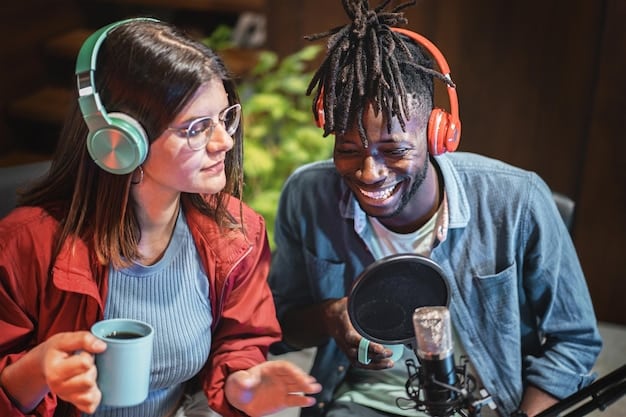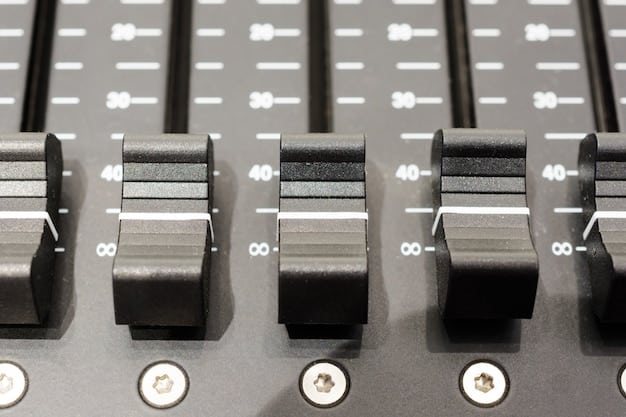Unsigned Hype: Getting Your US Rap Music Played on College Radio

Getting your music played on college radio stations across the US can be a game-changer for emerging rap artists, offering exposure to a dedicated and influential audience, creating a buzz around your
music, and paving the way for broader recognition in the industry.
Breaking into the music industry as an unsigned rap artist can feel like an uphill battle. Gaining airplay on college radio stations across the US is a strategic move that can amplify your voice and build a loyal fanbase, shining a spotlight on US Rap’s Hidden Gems: How to Get Your Music Played on College Radio Stations Across the Nation.
Understanding the Power of College Radio for US Rap Artists
College radio stations hold a unique and powerful position in the US music landscape. They are often the first to embrace emerging artists and genres, providing a platform for innovative and independent music that may not receive exposure on commercial stations. For US rap artists looking to build a following, college radio can be a crucial stepping stone.
Why College Radio Matters
College radio stations are known for their eclectic playlists and their dedication to supporting independent music. They cater to a demographic that is often more open to new sounds and artists, making them an ideal target audience for emerging US rap talent.
Furthermore, college radio stations often have strong ties to their local communities, hosting events and supporting local artists. This can provide valuable opportunities for US rap artists to connect with fans and build a local following.
- Discoverability: College radio is often a haven for discovering new talent, offering a platform for artists who might not get mainstream attention.
- Target Audience: US rap music is highly appreciated among college students.
- Community Engagement: College radio stations build local support.
- Industry Recognition: Gaining traction on college radio can lead to broader industry recognition and opportunities.
College radio’s influence goes beyond just airplay. It can lead to press coverage, interviews, and opportunities to perform at college events. All of these can help US rap artists build their brand and connect with fans.
Crafting Your Music for College Radio Airplay
Before you start reaching out to college radio stations, it’s essential to make sure that your music is radio-ready. This means ensuring that your recordings are high-quality, your lyrics are clean (or at least radio-friendly), and your music is representative of your artistic vision. For US rap artists, this is particularly important.
Production Quality is Key
In today’s music landscape, listeners expect a certain level of production quality, and college radio stations are no different. Your recordings should be professionally mixed and mastered to ensure that they sound good on the air.
Investing in professional recording equipment or working with a skilled audio engineer can make a big difference in the quality of your music. This is an investment in your career as a US rap artist.
Creating music with radio in mind is a key factor, as clean lyrics allow your rap songs to be played more often without censorship.

Content Considerations
While college radio stations are generally more open to edgy and alternative content than commercial stations, it’s still important to be mindful of your lyrics and subject matter. Some stations may have policies against explicit language or certain themes. Especially if you’re a US rap artist, you do not want to alienate your future audience.
- Lyrical Content: Ensure your lyrics resonate with college students.
- Originality: Showcase your unique voice and perspective.
- Cleanliness: Be mindful of explicit content, as some stations may have restrictions.
Consider creating “radio edits” of your songs that remove any offensive language or content. This will increase the chances of your music being played on a wider range of stations. Being a US rap artist does not mean your music needs to be explicit.
Researching and Targeting the Right College Radio Stations
Not all college radio stations are created equal. Some stations focus on specific genres or subgenres, while others have a more general approach. For a US rap artist, it’s essential to research and target the stations that are most likely to play your music.
Finding the Right Fit
Start by creating a list of college radio stations in your region or in areas where you have a strong fanbase. Look for stations that play hip-hop or rap music, or that have a reputation for supporting emerging artists. Doing your research as a US rap artist is crucial for success.
Many college radio stations have websites or social media pages where you can learn more about their programming and their DJs. Take the time to listen to their broadcasts and see if your music would be a good fit. Consider exploring stations in urban areas like Los Angeles, New York City, or Atlanta, to appeal to a large number of listeners of US rap music.
The internet is the best place to find prospective radio stations for play. Don’t limit yourself to colleges that reside within your general area.
- Genre Alignment: Focus on stations that play hip-hop or related genres.
- Location: Target stations in areas where you have a following or want to build one.
- Programming: Listen to the station’s broadcasts to get a sense of their style and content.
Building Relationships
Once you’ve identified a few target stations, start building relationships with the DJs and program directors. Attend station events, follow them on social media, and engage with their content. If you’re a US rap artist, show interest in their work.
Submitting Your Music to College Radio Stations
Now that you’ve crafted your music and identified your target stations, it’s time to start submitting your music. This is a crucial step in getting your music heard on college radio. Especially if you are working on being a successful US rap artist.
Creating a Press Kit
When submitting your music, it’s important to include a press kit that provides information about you and your music. This should include a bio, a press release, high-resolution photos, and links to your website and social media pages. Without a good press kit, you run the risk of not having songs played within the college radio’s rotation. Promoting your US rap songs to a wide audience will increase your chances of success.

Make sure your press kit is well-written and visually appealing. It should tell your story and make a compelling case for why the station should play your music. Especially if you are a US rap artist trying to get traction within the music industry.
Following Submission Guidelines
Each college radio station has its own submission guidelines, so it’s important to follow them carefully. Some stations may prefer physical copies of your music, while others may prefer digital submissions. Make sure you understand and adhere to each station’s requirements. Do not spam radio stations who do not air US rap music as you run the risk of being flagged.
- Professionalism: Present yourself as a professional musician.
- Following Directions: Adhere to each station’s submission guidelines.
- Persistence: Don’t be discouraged by rejections; keep submitting your music.
Be patient and persistent. It may take some time to get your music played on college radio, but with the right approach, you can increase your chances of success. Getting your US rap music on rotation takes time.
Maintaining Momentum and Building on Your College Radio Success
Getting your music played on college radio is just the first step. To truly capitalize on this opportunity, you need to maintain momentum and build on your success. This means continuing to engage with your fans, promoting your music, and seeking out new opportunities.
Engaging with Your Fans
College radio listeners are often passionate and engaged music fans. Take the time to connect with them on social media, respond to their comments, and thank them for their support. Use social media as a tool to propel your US rap music to a greater audience.
Consider hosting online Q&A sessions or live performances to give your fans a chance to interact with you directly. This will help you build a loyal following and create a strong sense of community around your music. This is especially important as a US rap artist working to break into the music industry and working on getting songs heard to a wider audience.
- Social Media: Engage with your fans on your social media.
- Live Performances: Perform live whenever possible.
- Networking: Network with other artists and industry professionals.
Promoting Your Music
Promote your college radio airplay on your website and social media pages. Let your fans know when and where they can hear your music. Being a US rap artist requires self promotion, but it can be well worth the results.
You can also create promotional materials, such as posters or stickers, to distribute at college radio stations and events. The more promotion you do, the more likely you are to reach new fans and build your career. Consider your role as a US rap artist and determine if your promotion aligns with the message your music sends.
Conclusion
Securing airplay on college radio stations is a significant achievement for emerging US rap artists. It provides a platform to reach a dedicated audience, build a following, and gain recognition in the music industry. By crafting high-quality music, targeting the right stations, and engaging with fans, you can maximize your chances of success. With persistence and dedication, US rap artists can unlock valuable opportunities for exposure and growth.
| Key Point | Brief Description |
|---|---|
| 🎵 Production Quality | Ensuring high-quality recordings is crucial for radio airplay. |
| 🎯 Target Audience | Focus on college radio stations that align with your genre and audience. |
| 📢 Promotion | Promote your airplay and engage with fans on social media. |
| 🤝 Networking | Building relations with radio station DJs and program directors can increase the chances of your songs being played. |
Frequently Asked Questions
▼
College radio stations often champion emerging genres and artists, offering a platform for innovative music that commercial stations might overlook, making it an ideal starting point for US rap artists.
▼
Ensure your recordings are high-quality, professionally mixed and mastered. Consider creating radio edits to remove explicit content, making it suitable for a wider range of stations.
▼
Research stations that play hip-hop or rap music, especially those known for supporting emerging artists. Listen to their broadcasts and review their playlists to see if your music aligns with their content.
▼
Include a detailed bio, a well-written press release, high-resolution photos, links to your website and social media profiles, and any notable achievements or reviews you’ve received.
▼
Engage with fans on social media, promote your airplay, perform live, and network with other artists and industry professionals to build on your initial success and expand your reach.
Conclusion
For emerging US rap artists, college radio presents a pivotal opportunity to gain exposure and build a dedicated following. By understanding the unique value of college radio, creating high-quality, radio-friendly music, and strategically targeting the right stations, artists can boost their visibility and propel their careers forward.





